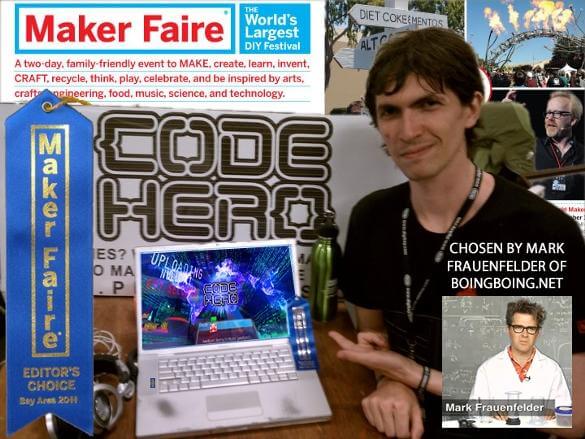
Most first person shooters ask kids to run around and kill enemy soldiers, demons, or prostitutes. Code Hero just wants you to kill your ignorance. An action packed video game, Code Hero is also a lesson on how to program computers. Players run around using a special ‘gun’ that lets them copy and past code in the virtual environment. They must use this code to build structures, manipulate the world around them, and ultimately defeat Null, the evil artificial intelligence that is threatening to conquer humanity. Check out the cool demo of Code Hero in the video below. Created by Alex Peake of Primer Labs and winner of both the Editor’s Choice and Kid’s Choice at this year’s Maker Faire, Code Hero stands out as both a popular and innovative take on educational gaming. Use a video game to teach students how to make video games. It’s so meta it just might work.
In Code Hero, you take the role of a human programmer, roaming through the virtual world of Codia. A friendly AI teaches you some of the basics of your new reality. Your code gun allows you to shoot enemies, but it also gives you the ability to pick up packets of real computer code. Those familiar with Java Script (or any programming language, really) will immediately recognize some of the patterns and syntax shown on screen. By copying and pasting these lines of codes, your gun allows you to shape the reality around you – changing the appearance and structure of the world, or even adding new buildings of your own. It sounds nerdy, but it looks amazing. And it’s fun!
Code Hero made a big splash at Maker Faire 2011, winning the Editor’s Choice award, and the Kid’s Choice award. But the surest sign of its success was that children actually enjoyed talking about it. Here’s a (candid?) interview Peake took earlier:
Code Hero is more than just a sneaky way to teach people the basics of JavaScript programming. It’s a part of a new paradigm in empowerment. Alex Peake and his colleagues at Primer Labs want to change the way in which people educate themselves. Why take expensive classes, attend lectures, or even watch videos when you learn best by doing? Interactive media, of which video games are the king, allow a student to control the pace of their learning, and direct the lesson to that information which most interests them. Code Hero is just the first of many such games Primer Labs intends to create. The goal is to give you a means by which you can both entertain and inform yourself on any topic. Code Hero could be followed by Advanced Math Hero, Basics of Nanotech Hero, Synthetic Biology Hero…you get the idea.

Educational gaming is nothing new. Those in my generation learned to type with help from Mavis Beacon, we trained in multimedia presentations using Mario Paint, and Oregon Trail taught us how to embrace the inequities and miseries of life by going hunting (that was the intended lesson, wasn’t it?). Code Hero stands out because it is a) a valid and entertaining game unto itself that approaches the quality of most mainstream video game productions and b) teaching something that students can immediately use on the same instrument they are learning with. When a student picks up some interesting ideas from Code Hero, he or she can close that window on their desktop, open up a Java editor and start to try things on their own unaided. In fact, Peake intends for there to be a parallel version of the game in the real world catered to just this type of exploration. “Actualia” is the flip side of Codia – a collection of Code Hero gamers and enthusiasts who gather to discuss, enjoy, and educate their peers on programming. Think hacker space meets game forum. Actualia will allow gamers to meet face to face, turning the education of Code Hero into an avenue to social learning and community that has long defined the best universities.
As we continue to reevaluate modern education, non-traditional approaches like Code Hero are going to start cropping up more frequently. We’ve already seen how Stanford is offering a free online class to the world. The Kahn Academy is hoping to revolutionize education with its free ten minute online videos and exercise problems students can browse and take at their own pace. Meanwhile South Korea is transitioning from textbooks to tablets and inviting robots into the classroom. Every time one of these attempts gains momentum, we get one step closer to finally reforming our educational structure to match the advances we’ve had in science and technology over the past century.

[image and video credits: Code Hero]
[sources: Primer Labs, Alex Peake]



